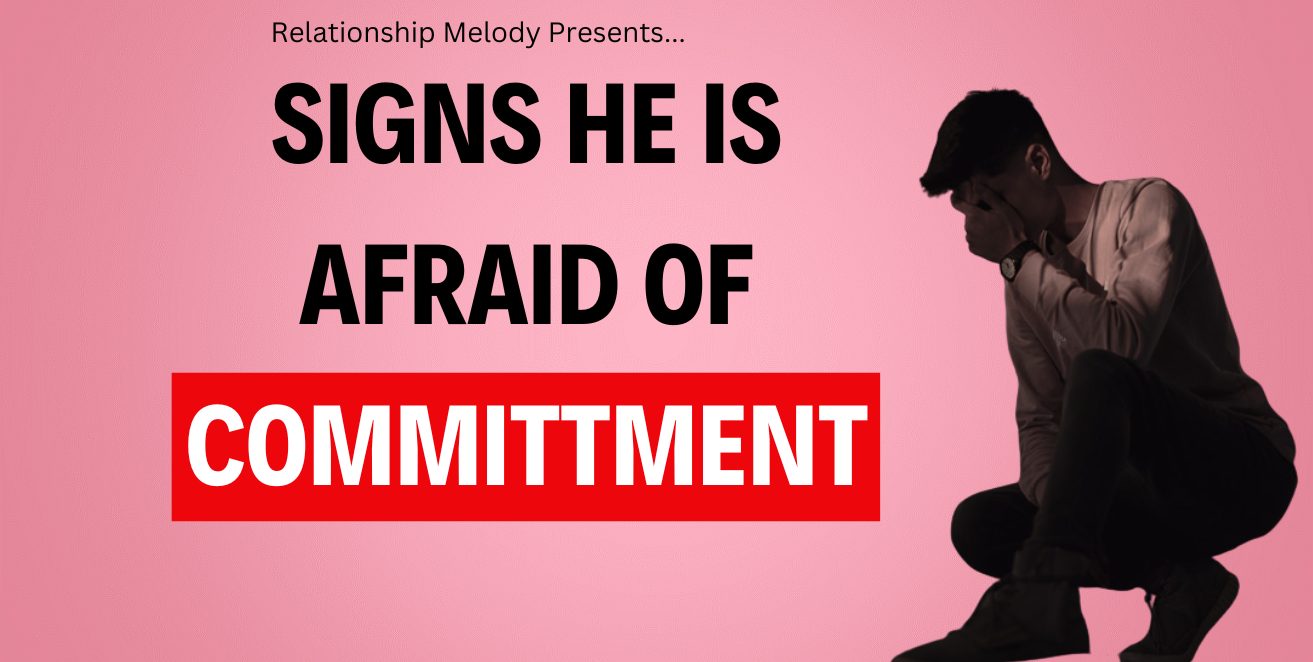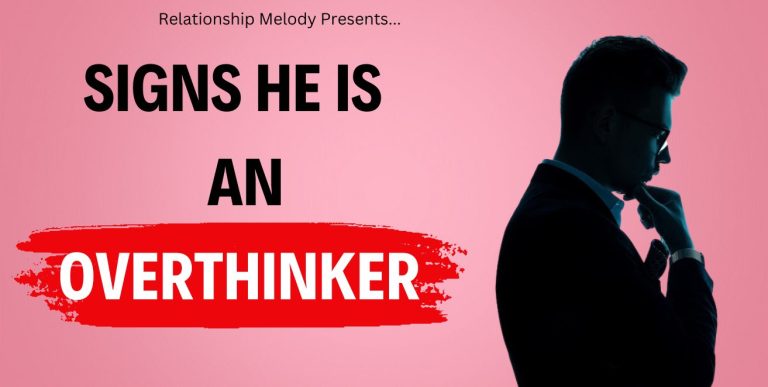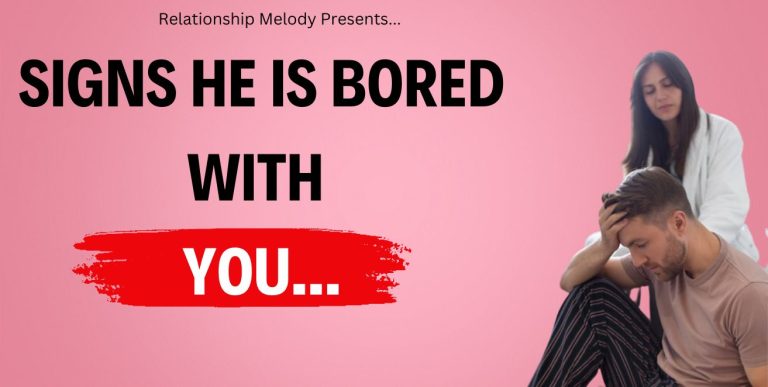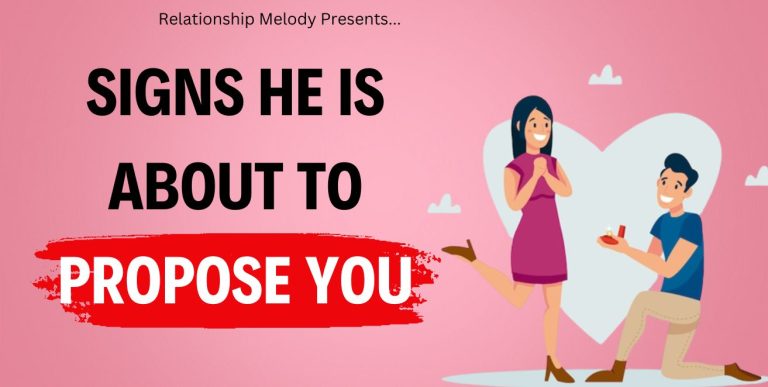25 Signs He Is Afraid of Commitment
When it comes to romantic relationships, commitment is a crucial factor that determines the success and longevity of a partnership.
However, not everyone is ready to take that leap of faith, and some individuals may exhibit signs of fear when it comes to committing to a serious relationship. If you’re in a situation where you suspect your partner may be afraid of commitment, it’s essential to recognize the signs early on.
In this blog post, we will delve into 25 common signs that may indicate your partner’s fear of commitment. Understanding these signs can help you gain insight into your relationship dynamics and make informed decisions moving forward.
Remember, everyone has their own pace when it comes to commitment, but it’s vital to identify potential roadblocks to ensure both partners are on the same page.
25 Signs He Is Afraid of Commitment
These are 25 signs to know.
#1 Frequent Excuses:
If your partner consistently avoids making plans for the future, it could be a sign of their fear of commitment.
They may come up with various reasons to delay or evade committing to future events or milestones, indicating their reluctance to invest in a long-term relationship. This behaviour stems from their underlying fear of getting too close and potentially being hurt.
#2 Limited Emotional Availability:
Partners who are afraid of commitment often struggle to open up emotionally. They may shy away from discussing deeper topics or avoid sharing vulnerable aspects of themselves.
Instead, they keep conversations light and surface-level, preventing a genuine emotional connection from developing. This emotional distance acts as a defence mechanism to protect themselves from potential heartbreak or intimacy.
#3 Hesitant to Label the Relationship:
If your partner is hesitant to use titles like “boyfriend” or “girlfriend,” it suggests their discomfort with defining the relationship.
They may prefer ambiguous terms or resist committing to a specific label, as it adds a level of seriousness and permanence they may not be ready for. This reluctance to define the relationship signifies their fear of being tied down or obligated to someone.
#4 Emotional Distance:
Individuals with commitment fear often maintain an emotional distance in their relationships. They may keep their guard up, avoiding vulnerability and intimacy.
This emotional detachment prevents them from fully investing in the relationship and creates a barrier between them and their partner. They may fear getting too attached or relying on someone emotionally, as it leaves them vulnerable to potential heartbreak or loss.
#5 Elusive Future Plans:
A significant sign of commitment fear is the avoidance or dismissal of long-term planning. Your partner may shy away from discussing future goals, such as vacations, moving in together, or other significant milestones.
This behaviour stems from their fear of committing to a shared future and the associated responsibilities and expectations that come with it.
They may prefer to live in the present moment or keep their options open, as committing to a future feels overwhelming or constricting to them.
#6 Fear of Intimacy:
Intimacy goes beyond physical closeness; it involves emotional vulnerability and connection. Partners who fear commitment may have difficulty getting physically or emotionally close.
They may avoid displays of affection, struggle with expressing their emotions, or resist deeper levels of intimacy. This fear stems from their apprehension about being fully known and accepted by another person, as it requires them to let down their guard and expose their true selves.
#7 Unwillingness to Compromise:
Commitment often requires compromise and finding a middle ground in a relationship. However, someone with commitment fear may struggle with making sacrifices or meeting their partner halfway.
They may prioritize their freedom and independence above nurturing the relationship. This behaviour reflects their fear of losing their autonomy or feeling trapped in a committed partnership, leading them to resist compromising on their desires or preferences.
#8 Flirting with Others:
Despite being in a committed relationship, individuals with commitment fear may seek validation from outside sources. They may engage in flirtatious behaviour or maintain connections with potential romantic interests.
This stems from their fear of fully committing to their current partner, as they may feel the need for validation or a backup plan if things don’t work out. Flirting with others allows them to keep their options open and avoid fully investing emotionally in their current relationship.
#9 Fear of Conflict:
Partners with commitment fear often avoid difficult conversations or conflicts within the relationship. They may shy away from addressing issues or expressing their needs and concerns.
This fear of conflict arises from their belief that addressing problems may lead to a deeper commitment or unravel the relationship.
They may prefer to maintain harmony on the surface, even if it means avoiding necessary discussions, which can hinder the growth and resolution of relationship challenges.
#10 Keeping Options Open:
Individuals afraid of commitment may continue to explore other romantic opportunities, even when in an exclusive relationship. They may flirt with or entertain the attention of potential suitors, keeping their options open as a safety net.
This behaviour reflects their fear of fully committing to one person and closing off other possibilities. They may be hesitant to put all their emotional eggs in one basket, fearing they might miss out on someone better suited for them.
#11 Inconsistent Communication:
If your partner frequently goes silent or fails to respond to texts or calls for extended periods, it may be a sign of commitment fear. They may avoid consistent communication as it requires ongoing effort and investment in the relationship.
Their inconsistent communication patterns reflect their fear of getting too close or revealing too much of themselves, leading them to create emotional distance by being unresponsive.
#12 Emotional Hot and Cold Behavior:
Partners with commitment fear may display inconsistent mood swings, making it challenging for you to gauge their feelings and intentions. They may alternate between moments of intense closeness and then suddenly withdraw or become distant.
This hot and cold behaviour is often rooted in their fear of intimacy and commitment. They may feel overwhelmed by emotional connection and retreat when things start to feel too serious or real.
#13 Overdependence on Independence:
Individuals with commitment fear often prioritize their freedom and independence above nurturing the relationship. They may be hesitant to make compromises or sacrifices that may be required for a committed partnership.
They prefer to maintain their individuality and may fear that committing to a long-term relationship will restrict their autonomy. This overdependence on independence can hinder the development of a deep, interdependent connection with their partner.
#14 Prioritizing Friends and Hobbies:
Partners who are afraid of commitment may consistently place their friends and personal interests above investing time and effort into the relationship.
They may prioritize socializing with friends, pursuing hobbies, or engaging in solo activities more than nurturing the bond with their partner. This behaviour reflects their fear of getting too entangled in the relationship or losing their sense of self outside of it.
#15 Fear of Abandonment:
Individuals with commitment fear often exhibit clingy behaviour or constantly seek reassurance from their partner. They may have an underlying fear of being abandoned or left behind. This fear drives them to seek constant validation and assurance that their partner won’t leave them.
They may become overly dependent or needy, as their fear of abandonment overrides their ability to trust and feel secure in the relationship.
#16 Unresolved Past Trauma:
Previous relationship wounds or childhood experiences can contribute to a fear of commitment. If your partner has experienced painful breakups, betrayal, or abandonment in the past, they may carry unresolved emotional baggage.
This trauma can instil a fear of getting hurt again, causing them to hesitate when it comes to committing to a new relationship. Their fear stems from the potential reactivation of old wounds and the associated pain and vulnerability that may accompany them.
#17 Unequal Relationship Investment:
Partners with commitment fear may show reluctance in investing the same level of effort or energy into the relationship as you do.
They may seem less committed or dedicated to nurturing the partnership, which can create an imbalance in terms of emotional investment. Their hesitation to invest may be rooted in their fear of getting too attached or being let down, leading them to hold back in the relationship.
#18 Avoidance of Long-Term Discussions:
If your partner consistently evades conversations about marriage, children, or other significant life milestones, it may be a sign of commitment fear.
They may actively avoid discussing these topics as they symbolize long-term commitment and responsibility. Their avoidance of long-term discussions indicates their apprehension about committing to a shared future and the potential changes and challenges that come with it.
#19 Fear of Losing Identity:
Commitment can be seen as a threat to one’s individuality, especially for those with commitment fear. They may fear losing their sense of self or personal freedom in a committed relationship.
This fear stems from the belief that committing to someone means sacrificing their own goals, dreams, or independence. They may resist getting too close or fully investing emotionally in the relationship to protect their sense of identity.
#20 Difficulty with Emotional Support:
Partners with commitment fear may struggle to provide emotional support during challenging times. They may find it challenging to be there for you emotionally, as it requires vulnerability and a deep emotional connection.

Their fear of commitment can hinder their ability to offer the necessary support and comfort in times of need. They may prefer to maintain emotional distance or rely on themselves, fearing that providing emotional support may further deepen the commitment in the relationship.
#21 Lack of Future Vision:
Individuals with commitment fear may show a lack of interest or vision for a shared future with you. They may struggle to discuss or envision a life together, making it challenging to see a long-lasting commitment.
This lack of future vision stems from their fear of committing to a shared path, as it requires them to consider the relationship’s long-term implications and responsibilities. They may prefer to live in the present moment and avoid thinking too far ahead.
#22 Pattern of Short-Term Relationships:
If your partner has a history of short-lived relationships with no clear commitment, it may indicate their fear of long-term commitment. They may struggle to sustain relationships beyond a certain point, often finding reasons to end things or feeling the urge to move on.
This pattern suggests their discomfort with committing to a long-term partnership and their tendency to avoid the emotional depth and vulnerability that come with it.
Read More: Signs he is being friendly
#23 Avoiding Meeting Family and Friends:
Partners with commitment fear may steer clear of introducing you to their loved ones, keeping different aspects of their life separate. They may avoid integrating you into their social circle or family gatherings.
This behaviour stems from their fear of blending different areas of their life, as it signifies a deeper level of commitment and involvement. By keeping these domains separate, they maintain a level of emotional detachment and avoid taking steps towards a more committed relationship.
#24 Unequal Future Planning:
While they may have individual future goals, partners with commitment fear may show little inclination towards including you in their plans. They may make decisions about their future without considering how it aligns with the relationship or fail to involve you in discussions about shared goals.
This behaviour indicates their hesitation to commit to a joint future, as they may fear the constraints or compromises that come with it. Their lack of inclusion in future planning can leave you feeling disconnected and uncertain about their level of commitment.
#25 Doubting Compatibility:
Individuals with commitment fear may express doubts about long-term compatibility. They may question whether you both can build a future together and whether the relationship can withstand the challenges that may arise.
These doubts often stem from their fear of committing to a relationship that may not meet their expectations or fulfil their needs in the long run. They may hesitate to fully invest emotionally or make commitments because of these lingering doubts.
Conclusion
Recognizing signs of commitment fear is crucial for fostering healthy relationships. If you notice several of these signs in your partner, it’s essential to have an open and honest conversation about your expectations and long-term goals.
Keep in mind that people can change and grow, but both partners must be willing to address their fears and work together towards building a stronger commitment. Remember to trust your intuition and prioritize your emotional well-being throughout this process.
By understanding these signs, you can navigate the complexities of commitment and make choices that align with your needs and desires.
Liked Our Article? Feel Free To Support Us
Our Patreon Page: https://www.patreon.com/RelationshipMelody

Welcome to Relationship Melody! Our website is dedicated to all things on relationships, dating, and love! We are passionate about helping you navigate the ups and downs of love, and our goal is to provide you with valuable insights and information that will make your journey toward a fulfilling relationship smoother and more enjoyable.







